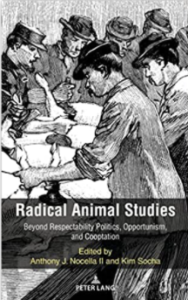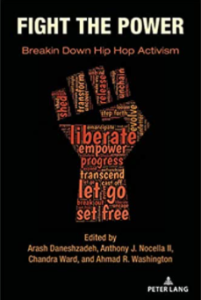Scholar-Activist Spotlight with Amber E. George – October 2019

Anthony Nocella II – As a young academic and woman, how is sexism permeating academia from how faculty treat you and students? What is your advice to young academic women?
Amber George – Since I teach exclusively online now, it can be somewhat difficult to discern how sexism is influencing the way I am perceived and treated in academia. There are times when I do feel that if I were a male, I would be more readily listened to during conference calls and online meetings.
I have noticed that online students use words such as “kind,” “caring,” and “compassionate” to describe me in student evaluations as opposed to “smart,” “knowledgeable,” or “intellectual.” I suppose this suggests that I am characterized favorably because my actions online can be perceived as conforming to feminine traits and female stereotypes.
My advice to young academic women is that while the sexism you may face in academia might be glaring, insidious, exhausting, and generally overwhelming, you should not give in or give up. And make no mistake about it; just because universities teach about social justice does not mean that sexism has been eradicated behind closed doors.
AN – As a mother and an academic, how does that affect being successful in your scholarship and do you see inequity there in higher education?
AG – Motherhood has changed me and the way I am treated within the Ivory Towers. As in many families, the brunt of childcare responsibilities have mainly fallen in my lap to figure out daily. Thus, women may need to ask for leniency when it comes to meeting deadlines or attending meetings when children are ill or lacking a babysitter. Within such a context, it is easy to feel overwhelmed, isolated, and overlooked.
There have been several times when I was not invited to join editing and curriculum projects for which there is no doubt I was the most qualified of those asked to participate. When asked why, I was met with excuses such as well, “we assumed you were too busy” or “we assumed you would not want to take on more responsibility.” I can’t say for certain I was excluded due to my familial obligations, but it sure seemed likely. In these situations, I was agitated to have been denied the opportunity to make my own decision. It was clear someone was making assumptions about my life that were unfair. Women should be able make their own decisions.
AN – Having published a lot of articles and books, do you think that when editing with men, women do more work in editing and writing, and if so how?
AG – I have had the pleasure of working with several wonderful co-editors over the years, and most are equitable in their approach to working with me. I do find myself picking up the slack at times and doing more of the administrative tasks, but it could simply be a function of the fact that I do it well and am a team-player.
AN – Do you think presenting or writing is more important and why?
I believe both are equally important. When done in conjunction, presenting and writing can complement each other beautifully. When one writes, words get out that can then be presented. Presenting is a means of opening those words up for important dialogue.
AN – As we know online courses, taught mostly by adjuncts, are often used to make money by having more students fill virtual seats with no facilities cost, but do you think teaching online has helped you and your students and do you think teaching online is a form of social justice in higher education?
AG – There is no doubt that online teaching has opened the doors of academia to many students who otherwise might not have the time, money, or ability to attend college in a traditional setting. Distance learning has broken down geography and economics especially for those who live in rural settings, people with disabilities, working single-parent families, and others.
100% online coursework means that students are not forced to find affordable, reliable transportation or child-care during traditional working hours. It means students can study on their schedule, can typically access a more extensive network of classes to complete much-needed curriculum requirements, and many programs can be completed quickly. This means students from all walks of life have more access now than ever before when it comes to earning their degrees. To me, this is an excellent means of promoting social justice in higher education.









